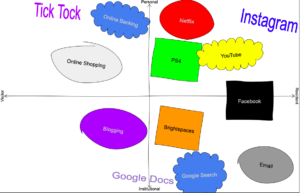How does social media engage in advocacy communications?
Social media is a tool that allows anyone to express their opinion on any topic. As stated in this week’s reading, “Social Media tools can be used for rabble rousing or for engagement across difference” (Clark & Aufderheide, 2013). This stuck out to me as I interpreted it as you can use social media for pleasure, or to express your voice and hear what others have to say. By engaging in communications on social media, people are able to develop their own PLN as they are receiving input from others online and will consider their rebuttal on the topic. This is why social media is used to “provide information, framing media, and platforms for debate, discussion, and negotiation of contested issues in a democracy” (Clark & Aufderheide, 2013).
How does social media use in public discourse potentially challenge advocacy communications?
Social media challenges public communications in our society. Whether it is for the better or the worse, people consistently debate and try to prove their standpoint on issues in our society. When participating in groups, the content within it is there to be discussed and to hear people’s opinions. When listening to countless opinions on the topic, there is often a conflict of interest as not everyone will align in opinions. When there is a discourse in public communications, this can potentially lead to negative things being said, or even cyberbullying.
Despite social media having lots of positive information, people need to realize that they need to consider the reliability of their sources. A lot of information spread online is in fact not true and can mislead people into thinking outlandish things. This is why it is important to keep a reliable PLN and avoiding conflicts within it.
Does your PLN amplify the views of others?
The intention of social media is “for people to meet, learn, exchange information, and discuss solutions” (Clark & Aufderheide, 2013). So, within a PLN, the opinion of someone will be amplified as others will consider what they have to say. I can personally say that within my PLN, the view of my peers is certainly being amplified. In specific, within this course, we use mattermost to communicate to other students and let them know when we complete assignments, discuss blog posts, etc. With that being said, we are all collaborating and hearing what the majority of our class has to say on a topic. So when I am hearing the opinion of my classmates on mattermost and I hear something that appeals to my interests, I am very likely to listen to what they are saying. This can be positive or negative as people may be expressing their opinion on a topic they are uneducated on.
How to better use social media to Build PLN – Influencers & Commentators
When watching the EDCI podcast with Markiel Simpson, he states that “the biggest help with social media is the networking” (Simpson, 2021). When saying this, he talks about how the input given by viewers on social media directly influences public figures. This is why I always keep in mind that my opinion on social media is always being heard, even if it is a comment on a photo. When using social media to build a PLN, it is important to express yourself in a positive way that is not offensive to the public. As everyone is an influencer on social media, the content you share is always under a microscope. The opinion of commentators in Facebook groups or on other social spaces contributes to your PLN and can be used in a positive way or in a negative way.
References:
Clark J., Aufderheide P. (2011) A New Vision for Public Media. In: Jansen S.C., Pooley J., Taub-Pervizpour L. (eds) Media and Social Justice. Palgrave Macmillan, New York. https://doi-org.ezproxy.library.uvic.ca/10.1057/9780230119796_5
Miller, Jesse. “EDCI 338 – 2021 – 02 – 22 Markiel Simpson.” YouTube, 21 Feb. 2021, www.youtube.com/watch?v=yCSpm1Lx8-A&feature=youtu.be.

Recent Comments